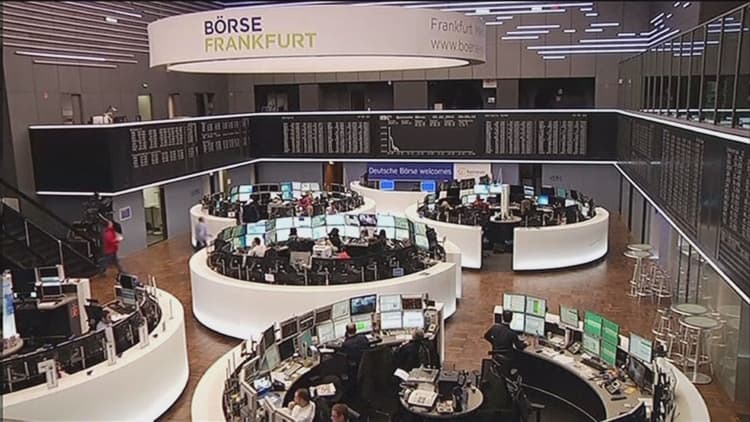
Funds are cutting allocations to Europe and Japan equities as fears grow that central banks' easing efforts will fail, Bank of America-Merrill Lynch's fund manager survey for April showed.
The survey found that managers consider "quantitative failure" the biggest tail risk -- a concern that appeared to be particularly represented in a pull back from Japan equities.
A net 3 percent of fund managers are underweight in their allocations to Japan stocks in April. That's not just a tumble from a net 15 percent overweight in March: It's the first net underweight position in the market since December 2012, when Prime Minister Shinzo Abe returned to office on a platform promising reforms to kick start the country's moribund economy.
Since then, the Bank of Japan (BOJ) has launched multiple rounds of massive quantitative easing which haven't always delivered an encouraging boost to economic growth. In late January, the central bank turned to a negative interest rate policy, but markets haven't behaved as expected, with the yen strengthening rather than weakening and stocks pulling back.
Europe fund managers could follow investors in Japan in turning underweight, the survey said.
While Europe was seen as the most attractive region globally, allocations have fallen. A net 33 percent of fund managers were overweight Eurozone equities, down from 41 percent last month.
The survey found that fund managers invested in Europe, where the European Central Bank (ECB) adopted a negative interest rate policy in mid-2014, had similar concerns as those invested in Japan.
A record 55 percent of European fund managers said European Union monetary policy was "too stimulative," the highest since the survey began in 1998.
Confidence in the stimulus' ability to be a major source of European economic growth dropped to 15 percent in April from March's 24 percent, the survey said. Only a net 6 percent expect the European economy to strengthen over the next 12 months, down sharply from 24 percent in March.
This was reflected in sector allocations as well: fund managers increased their underweight position in banks by 10 percentage points. Banks' profits are expected to take a hit from negative rates.
Fund managers don't appear to be putting the cash from reduced Japan and Europe allocations to work: cash levels jumped to 5.4 percent in April, near February's 15-year high of 5.6 percent and up from 5.1 percent last month.
While the survey typically views a cash balance above 4.5 percent as a contrarian buy signal, this time it called the level "superficially bullish," as it's rare for cash levels to rise amid a risk rally.
That may mean the cash might not head into other assets any time soon.
"With valuations for bonds and equities at their seventh highest reading in 13 years, investors may be turning to cash to protect against the downside while shunning risk assets where valuations constrain the upside," said Michael Hartnett, chief investment strategist at Bofa-ML, in a statement. "Range-based trading is likely to continue."
Follow CNBC International on Twitter and Facebook.
—By CNBC.Com's Leslie Shaffer; Follow her on Twitter @LeslieShaffer1




